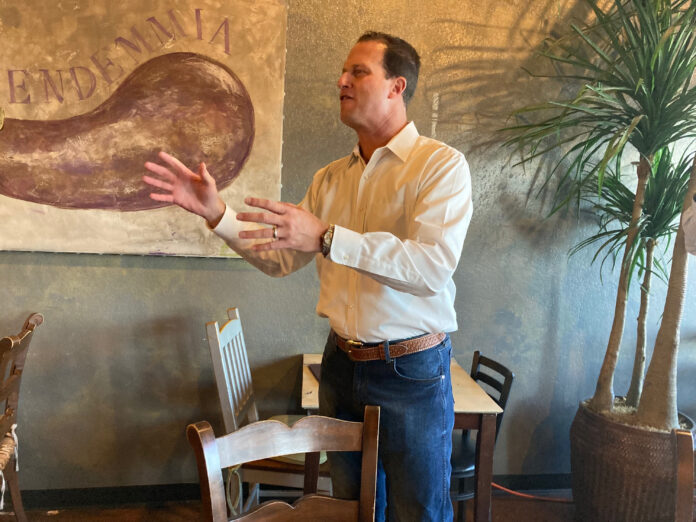
Texas political leaders and oil and gas producers are fighting President Biden’s proposed budget reconciliation bill with all the force they can muster, saying the bill’s energy-related measures would severely damage the nation.
U.S. Rep. August Pfluger, R-San Angelo, Midland oilman Steve Pruett and the Texas Independent Producers and Royalty Owners Association say Biden’s plan for $3.5 trillion in spending on climate measures and social programs includes harmful regulations and tax increases that would push the country toward shortages and blackouts.
Speaking on the House floor in Washington, Pfluger said Biden “has put the United States on the path toward an energy crisis comparable to the current crisis in Europe, where multiple countries are experiencing industry-wide shutdowns and preparing for cataclysmic blackouts due to their failed policies and reliance on Russian gas.
“Cold, dark and hungry is where our families will be if we continue along this path,” the congressman said. “We cannot shackle our production with ill-advised policies and regulations. The Permian Basin is the reason that every American can enjoy affordable, reliable energy. Energy security is national security and nothing can be more important.
“Anyone voting in favor of reconciliation is voting against American energy and against the independence that keeps our national security so strong,” Pfluger said. “I urge my colleagues to support the energy industry.”
Proponents of the bill, which only requires majority approval in the U.S. House and Senate, say it would bolster Biden’s plan to cut emissions by 50 percent by 2030, compared with 2005 levels, with a new clean electricity payment program, incentives for clean energy and clean vehicles, investments in “climate-smart” agriculture and forestry and new consumer rebates for home electrification.
Pruett, president-CEO of Elevation Resources in Midland, had just written a letter to nine House Democrats and conservative Democratic U.S. Sens. Joe Manchin of West Virginia and Kyrsten Sinema of Arizona in which he said the alternate power sources that Biden and Energy Secretary Jennifer Granholm advocate so strongly cannot match the benefits that oil and gas provide to Texas.
“Renewable sources like wind power do not pay severance taxes nor do these projects pay the magnitude of royalties that our industry pays to its public and private landlords,” he said. “Public secondary and higher education, county hospitals, counties and state-funded social services would struggle to replace the taxes that our industry pays to them, which amount to up to half of a West Texas county’s or school district’s revenues. Instead, renewable power projects receive tax credits of a $1 reduction for every dollar invested.”
Pruett said the reconciliation bill “has provisions designed to put U.S. oil and gas producers out of business, including the elimination of intangible drilling costs, which would mean reduced investments in drilling oil and gas wells to maintain production.
“President Biden’s plan would transfer jobs overseas and source petroleum from nations hostile to the U.S. who emit more pollution and don’t provide jobs or pay taxes here and it would raise energy prices overall, hurting those who are least able to afford it,” he wrote. “The U.S. has exceeded the CO2 emissions reduction targets set by the Paris Climate Accord by replacing coal-fired power generation with clean natural gas and we can further reduce emissions by building natural gas pipelines across New York State to replace the use of heating oil delivered by diesel trucks to Boston and across New York and New Jersey.”
TIPRO President Ed Longanecker said from Austin that the reconciliation package’s proposed fee on petroleum and natural gas systems “establishes an unprecedented national energy tax.
“In 2020, oil and natural gas provided 69 percent of total U.S. energy consumption,” Longanecker said. “Placing a tax on such critical energy sources would impact oil and gas jobs, household energy bills and even the price of gasoline. It would also raise costs on goods and services that rely on natural gas as a feedstock and energy source, including food and medical supplies.”
Longanecker said the new tax “would unnecessarily increase the burden on American consumers who are already struggling to pay their bills, heat their homes and put food on the table.
“If this national energy tax were to be implemented, households across the United States could seriously suffer, including Texans,” he said. “Energy poverty, or the disproportionate burden that low-income households face when it comes to energy bills, is a real issue that many policymakers attacking oil and natural gas choose to ignore.
“In certain areas in Texas, low-income households pay up to 28 percent of their monthly income to cover their energy needs. Even a slight increase in energy prices could force families to choose between their groceries or keeping the lights on.”



